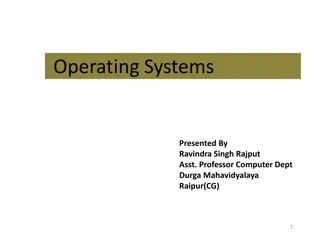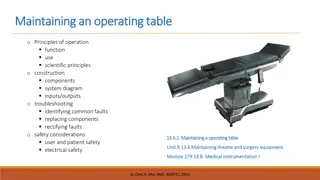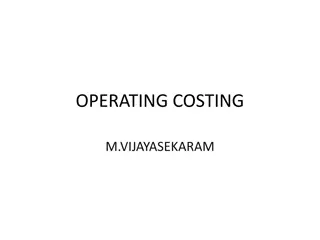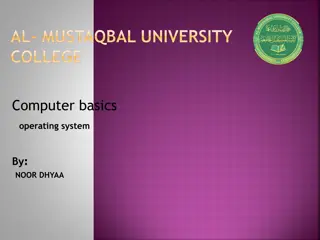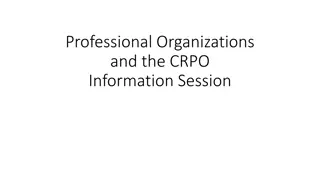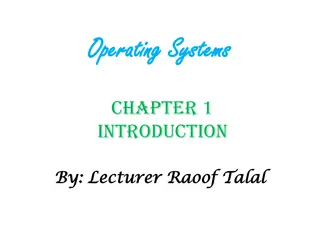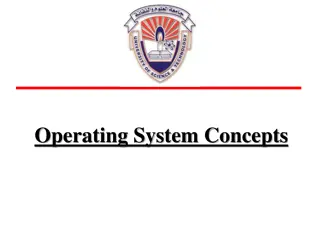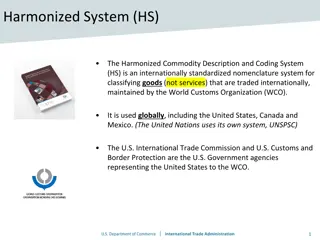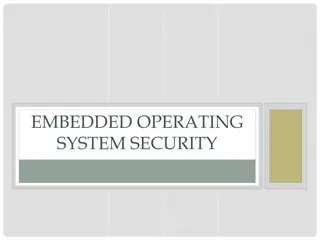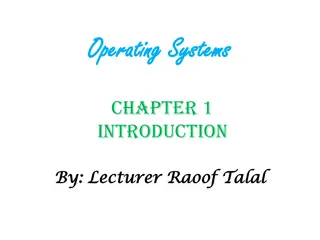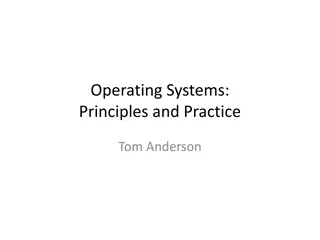
Strategies for International Business Operations
Learn about key strategies for operating internationally such as subsidiary businesses, joint ventures, partnerships, agencies, and more. Discover the reasons behind choosing these strategies, like risk control and access to local expertise. Explore how businesses can re-engineer products to meet global market demands. Understand the benefits and challenges of international expansion through subsidiary ownership, joint ventures, and other strategies.
Download Presentation

Please find below an Image/Link to download the presentation.
The content on the website is provided AS IS for your information and personal use only. It may not be sold, licensed, or shared on other websites without obtaining consent from the author. If you encounter any issues during the download, it is possible that the publisher has removed the file from their server.
You are allowed to download the files provided on this website for personal or commercial use, subject to the condition that they are used lawfully. All files are the property of their respective owners.
The content on the website is provided AS IS for your information and personal use only. It may not be sold, licensed, or shared on other websites without obtaining consent from the author.
E N D
Presentation Transcript
E1 STRATEGIESFOR OPERATING INTERNATIONALLY Write a list of the top five countries that the UK imports from and exports to. Why do we trade more with these countries? What do you think we export? What do you think we import? Choose one major country that we trade with and research our imports and exports. STRATEGIES FOR OPERATING INTERNATIONALLY
STRATEGIESFOROPERATINGINTERNATIONALLY In this topic you will learn about Strategies for operating internationally, e.g. subsidiary businesses, joint ventures, partnerships, agencies, licensing, franchising, sub-contracting and outsourcing Reasons for using selected strategy, e.g. the speed of establishing operations, access to local business knowledge and expertise, cost control, risk control Re-engineering products and services to meet the demands and preferences of international markets, e.g. manufacturing vehicles for export with left-hand drive
STRATEGIESFOROPERATINGINTERNATIONALLY In this topic you will learn about Strategies for operating internationally, e.g. subsidiary businesses, joint ventures, partnerships, agencies, licensing, franchising, sub-contracting and outsourcing Reasons for using selected strategy, e.g. the speed of establishing operations, access to local business knowledge and expertise, cost control, risk control Re-engineering products and services to meet the demands and preferences of international markets, e.g. manufacturing vehicles for export with left-hand drive
STRATEGIESFOROPERATINGINTERNATIONALLY Subsidiary businesses have at least 50% of their shares owned by a parent company Owning a subsidiary in another country will benefit the parent company in a number of ways: Diversifying risk as the foreign market is not affected by economic conditions in the domestic market Tax liabilities might be reduced A workforce can be employed with the skills required to meet the needs of the local market e.g. language skills
STRATEGIESFOROPERATINGINTERNATIONALLY Joint ventures occur when two or more business agree to act collectively to set up a new business venture with all parties contributing equity to fund the set up and purchase of assets By operating in a joint venture a business can combine expertise and utilise the local knowledge of the foreign business What are the benefits to JLR of its joint venture with Cherry? Risk can be shared and an outlet can be secured to sell products in the foreign market However, cultural differences might undermine the venture and the local partner might gain valuable expertise, becoming a future competitor
STRATEGIESFOROPERATINGINTERNATIONALLY Partnerships occur when a business forms an alliance with one or more businesses abroad As with joint ventures this provides access to markets and expertise However, the partnership is less formal Therefore, the business does not need to divulge as much information regarding operations This safeguards the business from the threat of competition in the future
STRATEGIESFOROPERATINGINTERNATIONALLY Agencies are professional businesses that have an understanding of local markets in specialist fields They can be used to establish a foothold in a local market They may have a network of contacts, such as local suppliers, that can make it easier for a business to set up They might also have details of local labour that can help the business in terms of recruiting the right calibre of employee
STRATEGIESFOROPERATINGINTERNATIONALLY Licensing a business gives permission to a third party to sell goods or services abroad This is often linked to an exclusivity deal for a specific country or region It allows a business to expand without having significant costs Although it will provide expertise to the licensee, the main benefit is the stream of income that will accrue to the business providing the license
STRATEGIESFOROPERATINGINTERNATIONALLY Franchising occurs when one business, the franchisor, gives another business, the franchisee, permission to trade using the franchisors name and selling the franchisors goods or services What are the advantages to McDonalds of offering franchises in China? This is a less risky option for moving into foreign markets but can mean additional costs and a loss of independence The franchisee will also require support from the franchisor
STRATEGIESFOROPERATINGINTERNATIONALLY Sub-contracting occurs when a business provides specific work for a foreign party to complete This can be on an ad hoc basis, providing work when and where it is required It allows the business to contract work to anywhere in the world The business does not have to pay for any long term costs It can re-contract to those workers it believes did a good quality job
STRATEGIESFOROPERATINGINTERNATIONALLY Outsourcing occurs when a business contracts out production to a foreign business over a period of time This might lead to a loss of quality control but can allow the business to match supply to meet demand The outsource business might be a specialist, which is likely to lead to an improvement in the quality of the product Again, foreign businesses will have a better understanding of local markets
REASONSFORTARGETING, OPERATINGINAND TRADINGWITHINTERNATIONALMARKETS Discuss how each point could relate to: Targeting sales abroad Operating in another country Trading with other countries Low cost Increased wealth New markets Shared expertise Spread risk Reasons Tax Specialist skills advantages Government incentives Proximity to raw materials Proximity to market
STRATEGIESFOROPERATINGINTERNATIONALLY For each of the strategies for operating internationally assess the reasons for using each one against the following criteria: The speed of establishing operations 1. Access to local business knowledge and expertise 2. Cost control 3. Risk control 4. Rank each strategy according to its strengths in meeting each criteria
RE-ENGINEERINGPRODUCTSANDSERVICESTOMEETTHE DEMANDSANDPREFERENCESOFINTERNATIONALMARKETS Businesses will have to change the products and services that they produce to be able to operate in other countries This might be expensive How has Foodpanda changed the marketing mix? However, there is little alternative, particularly if it is required by law UK car manufacturers have to export cars with left- hand drive E.P8 Explain how products and processes have to be adapted for international markets by a selected business. Explain five different products that have to be re- engineered in order to export them to other countries


